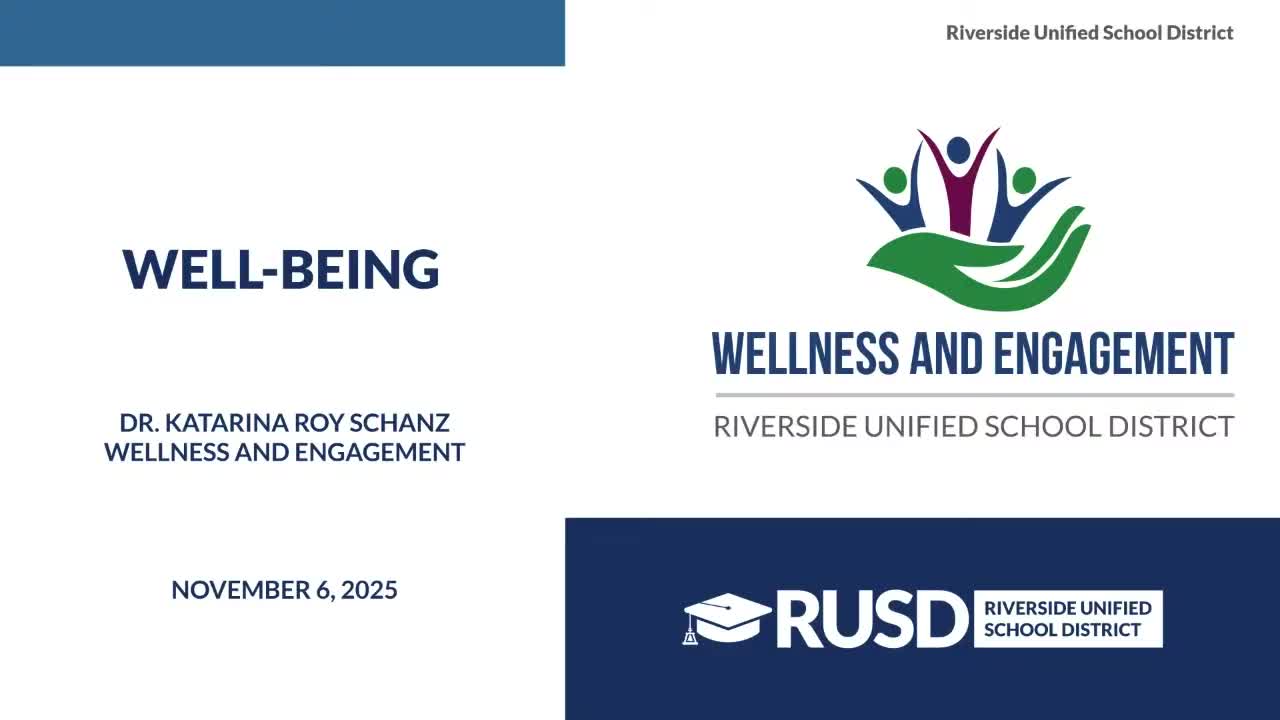Riverside Unified highlights districtwide wellness system, PBIS recognition and school‑based mental health services
Get AI-powered insights, summaries, and transcripts
Subscribe
Summary
District leaders reported on Thursday that Riverside Unified has built a multi‑tiered wellness system with wellness centers at all five comprehensive high schools, state‑licensed counselors at school sites, and measurable gains on a universal SEL screener.
Riverside Unified School District leaders told the school board on Thursday that the district’s multi‑tiered wellness system has expanded to include wellness centers at all five comprehensive high schools, licensed mental‑health clinicians at school sites, and universal social‑emotional screening that showed measurable improvement.
"Our work began in 2015‑16 and has grown into a robust system of support," Dr. Katarina Shantz, director of wellness and engagement, said. She described a three‑tier model: universal (Tier 1) instruction including Positive Behavior Interventions and Supports (PBIS) and classroom social‑emotional learning; targeted (Tier 2) small groups and coordinated check‑ins; and intensive (Tier 3) individualized therapy and crisis response provided by licensed mental‑health clinicians.
Staff highlighted several metrics: the district’s universal SEL screener showed an increase in the share of students in the low‑risk range from 71 percent to 77 percent (a 6 percentage‑point gain), staff said. Counselors and licensed therapists provided services to more than 7,500 students last year and ran roughly 400 counseling groups, according to staff presentations.
School psychologists and SAP (Student Assistance Program) counselors described their work at different grade levels. "Our student assistance program counselors are state‑licensed clinicians," Monica Galvez said, describing individual and group therapy, case management and crisis intervention at preschool through eighth grade. Andrea Salazar, a lead SAP counselor, described high‑school wellness centers as places where students can decompress and access ongoing counseling: "We really do strive to provide a quiet space to regulate, as well as connect with others and receive support," Salazar said.
Board members praised the program and emphasized sustaining funding. "This is a foundational block — we can't cut this when budgets tighten," Trustee Dr. Tweed said, urging continued investment in the district‑level supports. Trustees also asked about family engagement and consent practices; staff said parents are contacted after crises and that, for ongoing counseling, parental consent is sought though students 12 and older may self‑consent under district practice and state rules.
Staff also discussed educator wellness programming and an annual employee wellness fair; they said supports aim to build resilience among staff to ensure adults are equipped to support students.
The board did not take action on the report; trustees asked staff to continue to track outcomes and return with information needed to sustain and communicate the program’s impact to the community.
Notes: California PBIS recognition for 18 schools was announced during this portion of the meeting; staff credited the PBIS framework with improving routines and supporting classroom behavior.
